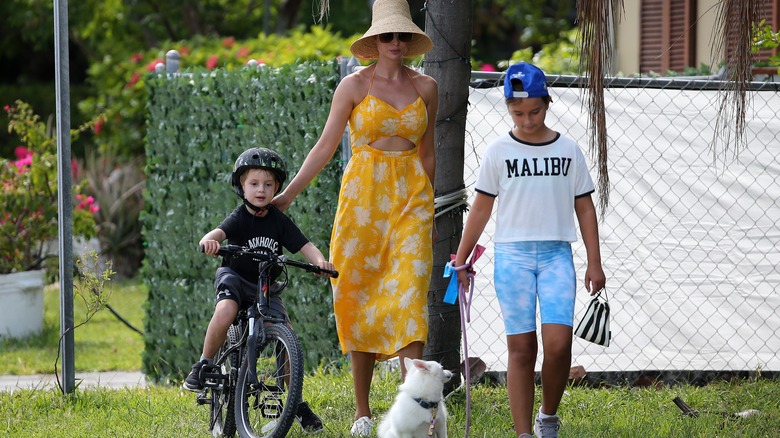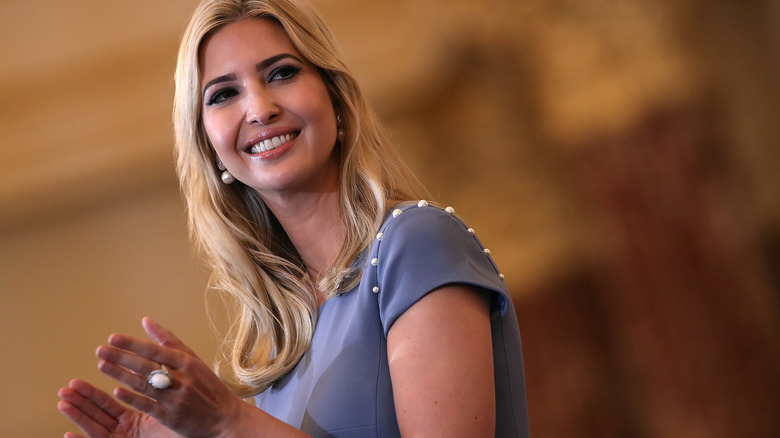Ivanka Trump's Journey With Postpartum Depression
Approximately one in nine mothers experience postpartum depression. The number may be even higher given that many of those experiencing it fear losing support from loved ones if they open up about their struggles, and therefore, they remain silent without treatment. Ivanka Trump, who dealt with it herself, recognizes this and spoke up, sharing her own experience with postpartum depression in an effort to help other women.
Postpartum depression differs from baby blues in regard to its length and intensity. Its symptoms generally include ones akin to depression such as feeling down or hopeless, experiencing sudden mood swings, isolating oneself, feeling inadequate or guilty, a change in appetite, intense fatigue, and more, as well as issues unique to postpartum depression such as difficulty bonding with your baby.
Postpartum depression can show up at any time within a year after giving birth, and it interferes with functioning in daily life. The condition is serious yet treatable and those experiencing it should seek help immediately. "That's really the important thing here; if you're feeling those feelings and symptoms, don't delay," California-based OBGYN Pari Ghodsi, MD, told Kindred Bravely. Fortunately, Trump did.
The former first daughter opened up about her experience
Former first daughter Ivanka Trump has three children, and you may have never known this about her, but with each birth, she experienced varying degrees of postpartum depression. "It was a very challenging, emotional time for me because I felt like I was not living up to my potential as a parent or as an entrepreneur and as an executive," she explained on an episode of "Dr. Oz" (via ABC News).
Further, "I had had such easy pregnancies that in some way the juxtaposition hit me even harder." The businesswoman, who strives to uplift other working women, decided to use her influence to demonstrate that it can impact anyone, no matter how ambitious or put together one is or may seem from the outside. "Look, I consider myself a very hard-charging person," Trump said. "I'm ambitious, I'm passionate, I'm driven. But this is something that affects parents all over the country."
She also encouraged others who are struggling to seek help
Navigating postpartum depression is not easy, and neither is admitting that you're struggling. Ivanka Trump was aware of this, however, she did so regardless in the hopes of encouraging those who are going through it in silence to feel seen and hopefully inspire them to get the help they need. "Awareness is so important — for us to talk about these issues so that people realize what is normal, what is not normal," OBGYN Pari Ghodsi, MD told Kindred Bravely. "And when you start recognizing what is not normal, then it takes the blame and the shame off of yourself and this idea of, 'Oh it's me. I'm a bad mom. I'm not trying hard enough. I'm not cut out for this.'"
Treatment typically consists of psychotherapy and medications like antidepressants. Contacting your primary care provider or OBGYN is a great place to start when seeking help. They can refer you to therapists if need be, and possibly introduce medication too. "Look, you would get help for any other medical problem, right?" New York-based psychiatrist Sue Varma, MD, told ABC News. "And postpartum depression is a medical problem and should be treated like one."
Trump is ultimately grateful for her experience as a mother, even if it was difficult at first. Coming out of postpartum depression enabled her to see better days ahead. As Trump informed People simply, "Being a mother is the most rewarding experience, but also the most wild and stressful."


